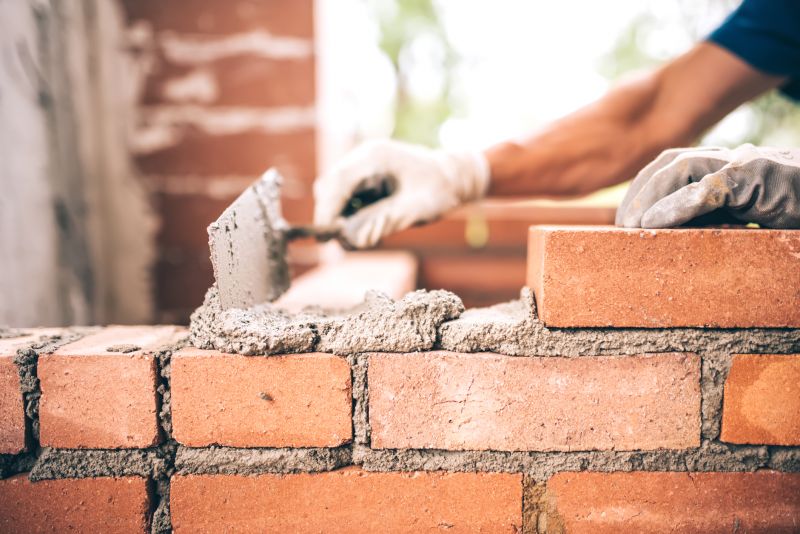Leading Masonry Service Products Every Professional Should Know
Explore essential tools and supplies that enhance efficiency, quality, and safety in masonry projects for skilled craftsmen.
 Masonry work is a skilled craft that involves the use of various tools and materials to create durable and aesthetically pleasing structures. For professionals and DIY enthusiasts in Randallstown, MD, having the right products is essential to ensure quality results and efficient workflow. From foundational elements to finishing touches, the selection of appropriate masonry supplies can significantly influence the outcome of any project.
Masonry work is a skilled craft that involves the use of various tools and materials to create durable and aesthetically pleasing structures. For professionals and DIY enthusiasts in Randallstown, MD, having the right products is essential to ensure quality results and efficient workflow. From foundational elements to finishing touches, the selection of appropriate masonry supplies can significantly influence the outcome of any project.
Types of Products For Masonry Service
Masonry Trowels
Tools used for applying and shaping mortar or concrete, available in various sizes and shapes for different tasks.
Mixers and Blenders
Equipment for blending mortar, grout, or concrete to ensure a uniform consistency suitable for masonry work.
Cutting Tools
Tools such as brick saws, angle grinders, and chisels designed for cutting and shaping bricks, stones, and blocks.
Mortar and Grout
Specialized materials for bonding masonry units and filling gaps, available in different formulations for various applications.
Sealants and Waterproofing
Products used to protect masonry surfaces from moisture and environmental damage, enhancing durability.
Safety Gear
Protective equipment including gloves, goggles, masks, and helmets to ensure safety during masonry projects.
Leveling and Plumb Tools
Instruments such as levels and plumb lines that assist in achieving accurate alignment and structure integrity.
Masonry Carts and Buckets
Containers designed for transporting and mixing materials easily on the job site.
Cleaning and Maintenance Supplies
Products for cleaning tools and masonry surfaces, ensuring longevity and proper upkeep.
Reinforcement Materials
Items like rebar and mesh that provide additional strength to masonry structures.
Chisels and Hammers
Hand tools used for detailed shaping, carving, and breaking masonry materials.
Masonry Saw Blades
Replacement blades designed for cutting through various masonry materials efficiently.
Mortar Rakes
Tools used for removing old mortar and preparing joints for repointing or repair.
Vibration Tools
Devices that help compact mortar and concrete, reducing air pockets and ensuring stability.
Formwork and Molds
Temporary structures used to shape concrete during setting and curing.
Popular Choices
Reliable tools for breaking and shaping bricks and stones, favored for their durability.
Power tools suitable for precise cuts in bricks, concrete blocks, and stones.
Efficient equipment for preparing large quantities of mortar or concrete quickly.
Tools designed for handling and positioning bricks safely and securely.
Versatile grout options that enhance adhesion and flexibility in masonry applications.
Comfortable gloves that offer protection against abrasions and chemical exposure.
Tools that facilitate accurate leveling and alignment of masonry units.
Devices used to remove air pockets and improve compaction of poured concrete.
Tools for shaping reinforcement bars to fit specific structural needs.
Tools for cleaning and shaping mortar joints for a neat finish.
Applicators for precise placement of sealants and caulks on masonry surfaces.
Lighting solutions for visibility during masonry work in low-light conditions.
Tools used to create smooth, rounded edges on concrete slabs and walkways.
Materials used to reinforce concrete slabs and walls for added strength.
Small tools for detailed mortar application and finishing touches.
Power tools designed for removing old mortar or concrete during repair work.
Specialized tools for detailed sculpting and shaping of stone surfaces.
A comprehensive masonry service setup often requires a combination of specialized tools, protective gear, and consumables. High-quality trowels, mixers, and cutting tools help achieve precise work, while safety equipment such as gloves, goggles, and dust masks protect workers during demanding tasks. Additionally, materials like mortar, grout, and sealants are crucial for the longevity and stability of masonry structures.
Choosing the right products involves considering the scope of the project, the type of masonry work, and the specific materials involved. Whether constructing a brick wall, installing stone veneer, or repairing a chimney, the right tools and supplies can make a significant difference. Proper maintenance and storage of these products also contribute to their effectiveness and lifespan, ensuring that masonry projects in Randallstown are completed efficiently and safely.
Key Buying Considerations
- Compatibility with the specific masonry materials you plan to work with, such as brick, stone, or concrete.
- Durability and build quality of tools to withstand frequent use on demanding projects.
- Ergonomic design to reduce fatigue during extended periods of work.
- Availability of replacement parts and accessories for long-term maintenance.
- Safety features and protective gear to ensure compliance with safety standards.
- Ease of use and handling, especially for complex or precision tasks.
- Weight and size of tools for maneuverability in confined or awkward spaces.
- Compatibility with other equipment you already own or plan to acquire.
- Versatility of multi-functional tools to cover various aspects of masonry work.
- Brand reputation and customer reviews for insights into product performance.
- Cost-effectiveness, balancing quality with budget constraints.
- Availability of technical support and warranties from suppliers.
- Storage and portability features for easy transport and organization on-site.
- Environmental conditions of the work site, such as moisture, dust, or temperature extremes.
- Specific project requirements, including structural load considerations and local building codes.
